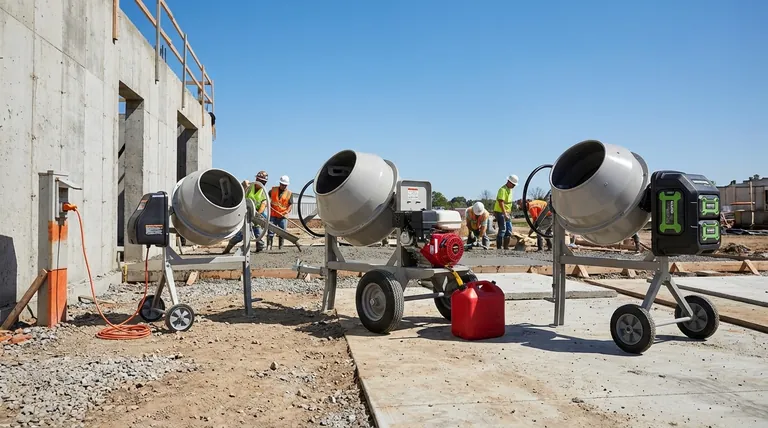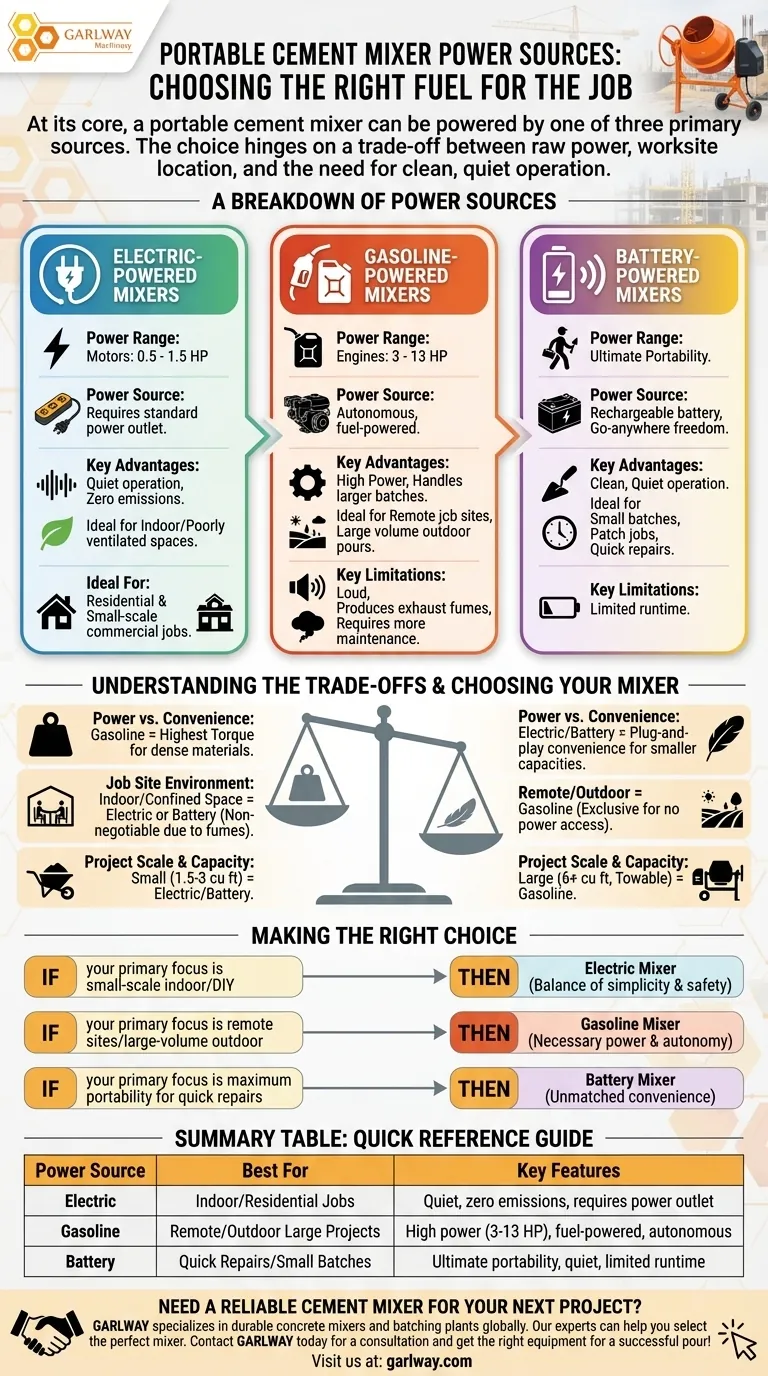At its core, a portable cement mixer can be powered by one of three primary sources: corded electricity, a gasoline engine, or a rechargeable battery. Each type is designed to meet the demands of different job sites, project scales, and portability requirements.
The choice of a power source is not about which is "best," but which best aligns with your specific environment. The decision hinges on a trade-off between raw power, worksite location, and the need for clean, quiet operation.

A Breakdown of Power Sources
Understanding the distinct characteristics of each power type is the first step in selecting the right tool for your project. The power source directly influences the mixer's performance, limitations, and ideal use case.
Electric-Powered Mixers
Electric mixers are a common choice for residential and small-scale commercial jobs. They typically operate with motors ranging from 0.5 to 1.5 horsepower.
These mixers require a connection to a standard power outlet, making them dependent on the availability of electricity at the job site.
Their primary advantages are quiet operation and zero emissions, which makes them the only suitable choice for indoor or poorly ventilated spaces.
Gasoline-Powered Mixers
For power and autonomy, gasoline engines are the standard. These engines are significantly more powerful, with ratings often between 3 and 13 horsepower.
This power allows them to handle larger, heavier batches of concrete and operate continuously on remote job sites where electricity is unavailable.
However, they are loud, produce exhaust fumes, and require more maintenance, restricting their use to well-ventilated, outdoor areas.
Battery-Powered Mixers
Representing the newest category, battery-powered mixers offer the ultimate in portability. They combine the go-anywhere freedom of a gas mixer with the clean, quiet operation of an electric model.
Their main limitation is runtime. They are best suited for small batches, patch jobs, and quick repairs where setting up cords or a gas engine would be inefficient.
Understanding the Trade-offs
Choosing a power source involves balancing competing priorities. What you gain in one area, you often compromise in another.
Power vs. Convenience
There is a direct correlation between power and fuel type. Gasoline engines provide the highest torque for mixing dense, large-volume materials, but require fuel and maintenance.
Electric and battery models offer plug-and-play or click-and-go convenience but are less powerful and suited for smaller capacities.
Job Site Environment
The location of your work is a critical, non-negotiable factor. Any indoor project, basement work, or job in a confined space absolutely requires an electric or battery mixer to avoid dangerous fume buildup.
Outdoor projects, especially in remote areas without power access, are the exclusive domain of gasoline-powered mixers.
Project Scale and Capacity
The size of your mixer is often tied to its power source. Small, 1.5 to 3 cubic foot wheelbarrow or pedestal mixers are commonly electric or battery-powered.
Larger, towable mixers that handle 6 cubic feet or more are almost always equipped with gasoline engines to manage the weight and volume of the material.
Choosing the Right Mixer for Your Job
Your project's specific demands should dictate your choice. Use these guidelines to make a clear decision.
- If your primary focus is small-scale indoor work or DIY projects with nearby power: An electric mixer offers the best balance of simplicity and safety.
- If your primary focus is remote job sites or large-volume outdoor pours: A gasoline-powered mixer is the only option that provides the necessary power and autonomy.
- If your primary focus is maximum portability for quick repairs in various locations: A battery-powered mixer provides unmatched convenience for small-batch tasks.
Ultimately, matching the power source to the unique demands of your job ensures efficiency, safety, and a successful outcome.
Summary Table:
| Power Source | Best For | Key Features |
|---|---|---|
| Electric | Indoor/Residential Jobs | Quiet, zero emissions, requires power outlet |
| Gasoline | Remote/Outdoor Large Projects | High power (3-13 HP), fuel-powered, autonomous |
| Battery | Quick Repairs/Small Batches | Ultimate portability, quiet, limited runtime |
Need a reliable cement mixer for your next project? GARLWAY specializes in construction machinery, offering durable concrete mixers and batching plants for contractors and construction companies globally. Our experts can help you select the perfect mixer for your job site's power requirements. Contact GARLWAY today for a consultation and get the right equipment for a successful pour!
Visual Guide

Related Products
- Commercial Electric Concrete Mixer Machine HZS 50 Small Batch Plant for Sale
- Portable Electric Concrete Mixer Machine for Cement Mixing
- Ready Mixer Machine for Construction Ready Mix Machinery
- Commercial Construction Mixer Machine for Soil Cement Mixing Concrete
- Portable Concrete Mixer Machine Equipment for Mixing Concrete
People Also Ask
- How much concrete can you mix in a small mixer? Achieve Perfect Batches for Your Project
- How does a small cement mixer act as a catalyst at a construction site? Accelerate Your Project Timelines
- How does a small cement mixer improve time efficiency? Automate Mixing & Boost Productivity
- What are the factors to be considered when designing a concrete mixture? Master the Balance for Strength & Workability
- How does a small cement mixer save time and effort? Work Smarter, Not Harder on Your Construction Site

















